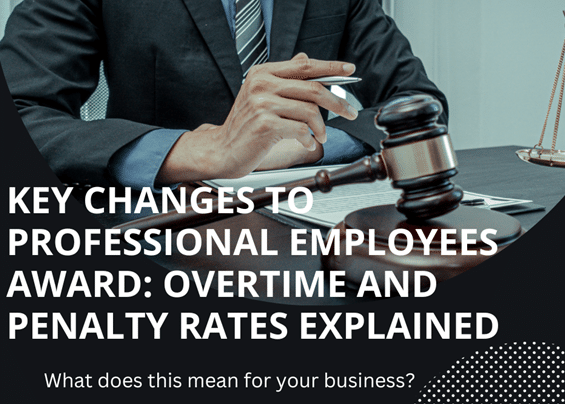The Australian professional workforce is set to experience significant changes, impacting those covered by the Professional Employees Award. Effective from the first full pay period starting on or after September 16, 2023, these alterations bring forth adjustments to overtime entitlements, penalty rates, and record-keeping requirements.
Overtime Entitlements:
Employees are now entitled to overtime pay if they work more than 38 hours per week or an average of 38 hours per week. Ordinary hours can be averaged over a period of up to 13 weeks. Employers can request or require overtime, considering factors such as salary or position. Additionally, overtime pay is mandatory for any additional work, including call-backs or remote work performed via electronic devices.
Penalty Rates:
Effective from the same date, employees are entitled to penalty rates for specific times and days worked. Full-time and part-time employees can expect higher rates for work done before 6 am, after 10 pm on Monday to Saturday, Sundays, and public holidays. Casual employees receive even higher rates for the same periods.
Payment for Overtime and Penalty Rates:
Employees must be paid their minimum hourly rate for overtime work. If overtime falls during times attracting penalty rates, the higher rate prevails. Employers and employees can mutually agree for time off instead of overtime pay, documented using the template in Schedule F of the award.
Example Illustration:
Consider Ian, a full-time engineer, asked to work an additional 6 hours on a Sunday. Since it’s overtime, he is entitled to 150% of his minimum hourly rate for the extra hours worked.
Exemptions:
Employees with an annual salary exceeding 25% above their minimum award wage are not entitled to overtime or penalty rates.
Record-Keeping Requirements:
Employees engaged in remote work outside regular hours must maintain a timesheet or record detailing the start and end times, along with a description of the work performed. This record should be provided to the employer promptly.
Employers are obligated to record hours exceeding 38 hours per week, work before 6 am or after 10 pm on Monday to Saturday, and work on Sundays or public holidays. However, this requirement excludes employees receiving an annual salary 25% higher than the relevant minimum annual wage.
In conclusion, these changes aim to ensure fair compensation for professional employees and transparent record-keeping practices. Employers and employees alike should familiarize themselves with the adjustments and ensure compliance with the updated Professional Employees Award.
This change was announced by the Fair Work Commission in September 2023, so if your business has not updated its policies accordingly, you may already be out of date. For more information, you can click here.
Performance Advantage has extensive experience in conducting workplace entitlement audits and providing general advice to employers about award compliance. If you need further help ensuring you meet your obligations as an employer, please contact us on 0408 897 079 or at suzanne@performanceadvantage.com.au.





